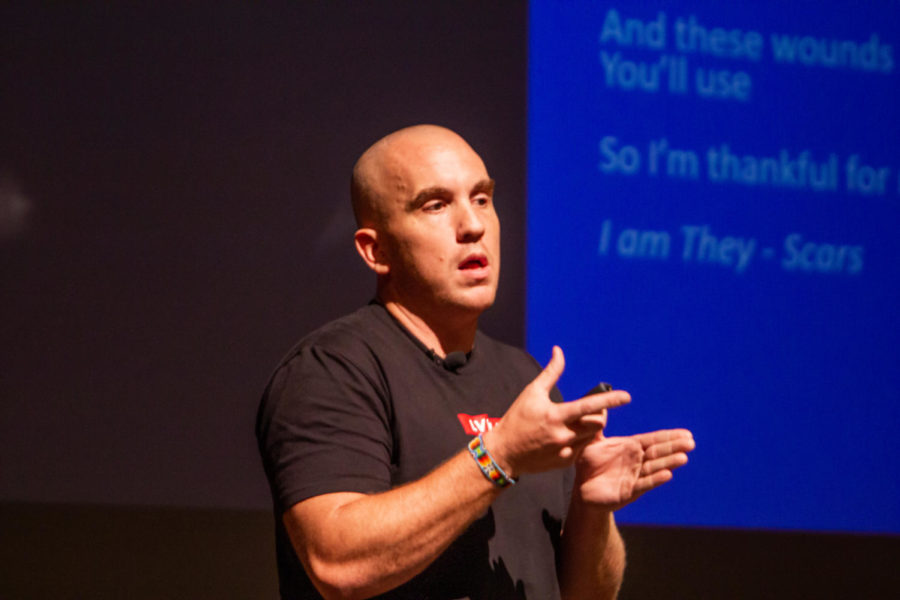Former Cyclone basketball star speaks out about mental health issues
Jake Sullivan talks to students about how he dealt with mental illness growing up and as a student athlete at Iowa State on Sept. 16 in the Great Hall of the Memorial Union.
September 16, 2019
Former Cyclone basketball player Jake Sullivan came to Iowa State late Monday to talk about his personal battles with mental illness and spread awareness of the issue.
Sullivan was a three-time Academic All-American and All-Big 12 selection when he played from 2000-2004. He was also nominated to Iowa State’s all-century team, he was named as one out of ten of the best players in the last 100 years. Alongside his accomplishments, he struggled with depression and obsessive compulsive disorder.
His mental health issues began when he was in 8th grade and started to develop signs of obsessive compulsive disorder. It was then that he began to devote himself to basketball where he excelled, but was anxious about doing poorly.
“I became deathly afraid of losing what I had worked so hard to achieve,” Sullivan said.
Sullivan said genetics plays a role in mental illness. He said his family has a history with mental problems and his parents tried to get him help from psychologists and psychiatrists, but they failed to change his situation. He said sometimes people look for solutions in the wrong places.
By the time he was 17, Sullivan was depressed and said he did not have the drive to get out of bed some days. He was living what he said was a double life, where he had one personality for people around him but a different attitude when he was alone. Eventually he thought about taking his own life, but said a voice told him to hold on for a little longer.
Iowa State was supposed to be the turning point: where he could meet new people and create a new life. For the first few weeks, he enjoyed his time at the university but his old problems came back to haunt him. To others, he looked like the model student and athlete, coming early to practices and staying late, but Sullivan said he acted that way because he did not want to drive home with others.
Nevertheless, he accomplished academic honors and the title of Big 12 freshman of the year in while he was suffering. Referring to basketball Sullivan said, “It was the ultimate thing that probably kept me alive.”
Eventually, he joined the Salt Company, a Christian ministry organization on campus. He also began doing exposure therapy after watching a movie called “A Beautiful Mind.” It was then he started to improve. Jake attributed both the therapy and his faith for helping him master his fears.
“Exposure therapy gave me healing, but it was my faith and the foundation of the Bible that helped me get through it,” Sullivan said.
Sullivan’s life is now heavily involved with ministry and helping others with mental health issues of their own. He offered some explanation as to why young people suffer from these problems: Sleep and stress as well as isolation are some of the biggest factors, Sullivan said.
Sullivan said he believes there are plenty of students and Division I athletes who struggle with mental health. Due to these factors, he said he thinks they turn to isolation and drugs for help. To combat this, his advice to friends and family is to endure through the pain of their loved one’s suffering and help them by giving them communities in which to improve. Another important way to help: celebrate in their small victories.
“There are nights that are long but every morning I know it’s a new day,” Sullivan said.
He said he believes the battle is a life-long process people will have to deal with, but he said he has chosen to see his affliction as a gift. Sullivan’s energy is transferred to helping his family and his son who also has some of the difficulties he experienced as well as his ministry work for others.
“The greatest gift I have ever been given outside of my faith is my mental illness,” Sullivan said.







